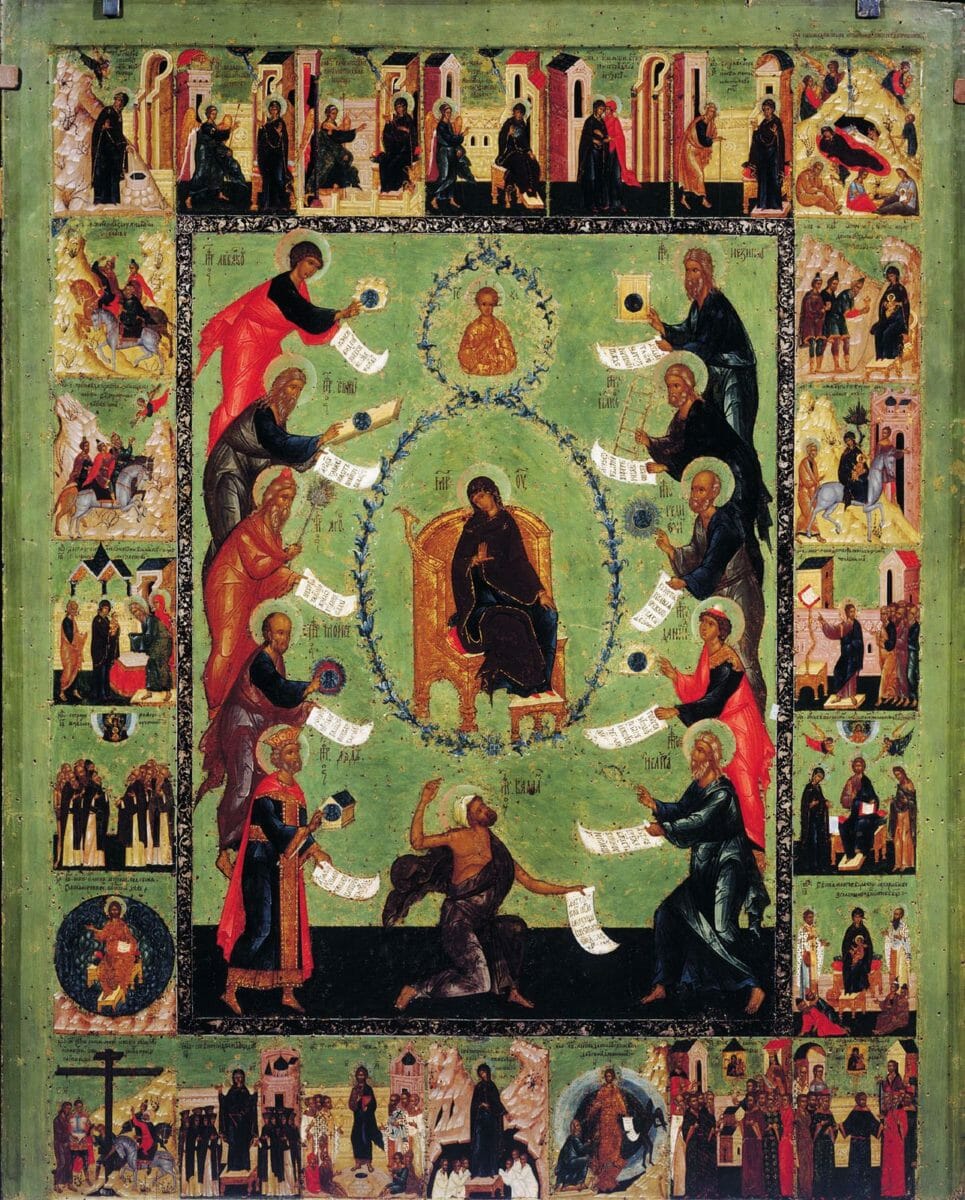Similar Posts

The state of affairs for English-language liturgical texts is fundamentally unstable. A core problem is that there is no existing body that has either the mission or the competence to review and approve English-language liturgical texts, so there is no settled path to a text being adopted once it is produced. In addition, differing jurisdictions have different preferences for register — modern vernacular vs. Elizabethan Early Modern English, and various flavors in between. Metered translations for prosomia and canons, after decades of a conventional wisdom that they were neither possible nor desirable, are becoming increasingly common. Existing translations are being revised as they are lived with for a bit and the translators and worshipers realize that there are issues that need addressing. Pastoral need means that texts have to be produced; however, economics of book publishing also mean that a text that has been published will have inertia on its side, regardless of the quality of the work. Pastoral need also dictates that what is familiar is going to be easier to internalize; at the same time, if we are not striving for excellence of liturgical translation, as with all of the sacred arts, then the entire exercise of translating becomes of questionable use.
The good news in this situation is that this is not likely to be the first time that this has happened in Orthodoxy’s history of taking root in new cultures and languages. Texts take time to settle, and the process is by nature iterative; we Anglophone Orthodox simply are getting to see the process unfold in real time.
As an object example: the canon of the Akathistos is attributed to the ninth-century St. Joseph the Hymnographer, and it is one of the most beloved hymns in the Byzantine liturgical cycle. The entire canon is sung during the Salutations service during Great Lent, and the eirmoi of the canon are sung as the katavasies during Orthros for any Sunday that does not fall within a festal period, which makes them familiar to many, be they sung in Greek, Arabic, Slavonic, Romanian, Georgian, or in one of the various English translations.
One of the more commonly-employed translations of the Akathistos canon in the Greek Orthodox Archdiocese is the metered translation of Fr. Seraphim Dedes. Originally published in 1990, the Greek Orthodox Metropolis of Pittsburgh published his revision of it in 2000, and for the last several years AGES Initiatives has also distributed the text, with minor emendations here and there, as well as musical scores for the canon in both staff and Byzantine notation, via the online Digital Chant Stand platform. (In the interest of full disclosure: I am the Executive Director of AGES Initiatives.) A metrical translation that allows the cantor to sing the familiar melody, scores in both notations, and easy availability have meant that the 2000 revision of Fr. Seraphim’s text has enjoyed widespread use.

After being sung continuously throughout the Archdiocese for nearly twenty years, however, Fr. Seraphim’s 2000 text has received its fair share of comments, criticism, and feedback otherwise. Thus it was that in June of 2018, Fr. Seraphim considered the accumulation of comments, conceded that his late-1990s work was not up to the standard of his current translations, and decided that it was time for a second revision of the text of the canon (recall that the 2000 edition was itself a revision).
Fr. Seraphim’s fundamental objective did not change: he sought to produce an accurate, metered, singable text in a modern English register. At the same time, he decided that it was not enough to spot-fix the various issues that had been raised. Instead, he approached the new text with two priorities: first, producing a text that was understandable, employing standard grammar and vocabulary choices as much as possible, and that would not be “ugly” (as one particularly blunt set of comments put it). Second, the new text would seek to “connect the dots” for the reader in terms of the wealth of scriptural and hymnographic cross-references embedded in St. Joseph’s original text, and explicitly signposting the Biblical imagery for the singer and listener.
The result of this new approach can be seen immediately in the first ode. Here is the Greek, followed by Fr. Seraphim’s 2000 text as most recently found on the Digital Chant Stand, followed by the 2018 revision:
| Greek text | 2000 text | 2018 revision |
|---|---|---|
|
ᾨδὴ αʹ. Ἦχος δʹ. Ὁ Εἱρμός. Ἀνοίξω τὸ στόμα μου, καὶ πληρωθήσεται Πνεύματος, καὶ λόγον ἐρεύξομαι, τῇ Βασιλίδι Μητρί, καὶ ὀφθήσομαι, φαιδρῶς πανηγυρίζων, καὶ ᾄσω γηθόμενος, ταύτης τὰ θαύματα. (δίς) |
Ode i. Mode 4. My mouth shall I open wide, * and it will thus be with Spirit filled. * A word shall I then pour out * unto the Mother and Queen. * I will joyously * attend the celebration * and sing to her merrily, * lauding her miracles. (2) |
Ode i. Mode 4. I open my mouth and pray the Spirit fill it, like David said, * to pour out a good word to the Queen and Mother of God. * I will celebrate * her feast with joy and gladness * and sing to her merrily, lauding her miracles. (2) |
|
Most-holy Theotokos, save us. O Lady, we bring to you our salutations and sing, “Rejoice,” * the word the Archangel said when he announced the good news. * In you are fulfilled * the sayings of the Prophets * and Biblical images, by which we honor you. (See below discussion.) |
||
| Τροπάρια. Ὑπεραγία Θεοτόκε, σῶσον ἡμᾶς. Χριστοῦ βίβλον ἔμψυχον, ἐσφραγισμένην σε Πνεύματι, ὁ μέγας Ἀρχάγγελος, Ἁγνὴ θεώμενος, ἐπεφώνει σοι· Χαῖρε χαρὰς δοχεῖον, δι’ ἧς τῆς Προμήτορος ἀρὰ λυθήσεται. |
Troparia. Most-holy Theotokos, save us. O Maiden and Virgin pure, the great Archangel beholding you, the animate book of Christ, which by the Spirit was sealed, did exclaim to you: Rejoice, O joy’s container, through whom shall the curse upon the primal mother be loosed. |
Troparia. Most-holy Theotokos, save us. |
|
Ὑπεραγία Θεοτόκε, σῶσον ἡμᾶς. Ἀδὰμ ἐπανόρθωσις, χαῖρε Παρθένε Θεόνυμφε, τοῦ ᾍδου ἡ νέκρωσις, χαῖρε πανάμωμε, τὸ παλάτιον, τοῦ μόνου Βασιλέως, χαῖρε θρόνε πύρινε, τοῦ Παντοκράτορος. |
Most-holy Theotokos, save us. Rejoice, Virgin Bride of God, the restoration of fallen man, the mortification of Hades, O blameless one, and the palace of the only King and Sovereign, rejoice. Fiery throne of the Ruler of all, rejoice. |
Most-holy Theotokos, save us. Rejoice, Virgin Bride of God! Through you was Adam restored to life * and Hades was put to death. O blameless one, rejoice! * Since you bore the King, * we say you are His palace, * the fiery throne of the Ruler of all. Rejoice! |
|
Δόξα Πατρὶ καὶ Υἱῷ καὶ Ἁγίῳ Πνεύματι. Ῥόδον τὸ ἀμάραντον, χαῖρε ἡ μόνη βλαστήσασα, τὸ μῆλον τὸ εὔοσμον, χαῖρε ἡ τέξασα, τὸ ὀσφράδιον, τοῦ πάντων Βασιλέως, χαῖρε ἀπειρόγαμε, κόσμου διάσωσμα. |
Glory to the Father and the Son and the Holy Spirit. Rejoice, you the only one who budded forth the unfading rose. Rejoice, who have given birth unto the sweet apple tree. Of the King of all the aromatic balsam, rejoice, O unwedded Maid, the world’s deliverance. |
Glory to the Father and the Son and the Holy Spirit. Rejoice! You have budded forth a holy Son, the unfading rose, * the One whom the Song has likened to a sweet apple tree. * Ever-virgin Dame, * rejoice! You are the fragrance * beloved by the King of all. Through you the world is saved. |
|
Καὶ νῦν καὶ ἀεί, καὶ εἰς τοὺς αἰῶνας τῶν αἰώνων. Ἀμήν. Ἁγνείας θησαύρισμα, χαῖρε δι’ ἧς ἐκ τοῦ πτώματος, ἡμῶν ἐξανέστημεν, χαῖρε ἡδύπνοον, κρίνον Δέσποινα, πιστοὺς εὐωδιάζον· θυμίαμα εὔοσμον, μύρον πολύτιμον. |
Both now and ever and to the ages of ages. Amen. O treasure of chastity, rejoice; through you we have risen up from out of our fall. Rejoice, sweet smelling lily that sends forth its fragrant scent, O Lady, to the faithful; aromatic incense and costly anointing oil. |
Both now and ever and to the ages of ages. Amen. We cry out, Rejoice, to you who are the treasure of chastity. * Through you we have risen from our fall. O Lady, rejoice! * We believers sense * the fragrances you send forth, * sweet lily and frankincense, costly anointing oil. |
Here, in what Fr. Seraphim calls an “amplified” translation, he focuses on scriptural allusions. In the eirmos, The gloss “like David said” emphasizes the various references to the Psalter embedded in the stanza, such as Ps118:131 (“I opened my mouth and drew breath because I longer for your commandments”) as well as Ps77:2 (“I will open my mouth in parables”), Ps80:11 (“Open your mouth wide, and I will fill it”), and Ps44:1 (“My heart has poured forth a good word”. Similarly, in his translation of the first troparion after the eirmos, Fr. Seraphim uses the gloss “as Isaiah foretold” to clarify the reference to Isaiah 29:11 (“And the vision of all this has become to you like the words of a book that is sealed. When men give it to one who can read, saying, ‘Read this,’ he says, ‘I cannot, for it is sealed.’”).
Another element of the text that has been rethought is the rendering of attributive participles in the Greek. These are always a sore point for the English translator, often resulting in awkward periphrastic constructions — the dreaded “you who” sentences. Fr. Seraphim generally avoided them in the 2000 text, but for the new version, he adopted the strategy of wording them as finite verbs. Thus, the 2000 version of the passage in the third troparion of the first ode, “Rejoice, you the only one who budded forth the unfading rose. Rejoice, who have given birth unto the sweet apple tree. Of the King of all the aromatic balsam, rejoice, O unwedded Maid, the world’s deliverance” becomes “Rejoice! You have budded forth a holy Son, the unfading rose, the One whom the Song has likened to a sweet apple tree. Ever-virgin Dame, rejoice! You are the fragrance beloved by the King of all. Through you the world is saved.”
A frequent criticism of the 2000 text over the years has been the use of unfamiliar, or otherwise peculiar-sounding, vocabulary. To an extent, this is a problem originating in the Greek poetry — the third troparion of the fourth ode, for example, contains this line “χαῖρε κογχύλη πορφύραν θείαν βάψασα, ἐξ αἱμάτων σου, τῷ Βασιλεῖ τῶν Δυνάμεων” — literally, “Hail, mussel [or ‘cockle’ as the English borrowing of κογχύλη] dyeing divine purple [garments] from your own blood for the Lord of Powers”. κογχύλη here is a problem; the specific shellfish used to provide the royal purple dye is known in English by the Latin name murex, and this is the word Fr. Seraphim used in 2000: “Rejoice, O murex who dyed in your own virgin blood the divine purple robe worn by the King of angelic hosts.” As a word without much of a context in everyday English, however, this has been the subject of many comments over the years, and for the new text Fr. Seraphim rethought the passage as follows: “We call you Seashell: its dye was used in royal cloth, and your own blood dyed the divine flesh of the King of Hosts.”

Fr. Seraphim also took the translation’s revision as an opportunity to participate in a longstanding hymnographic tradition: that of troping. Troping is, simply put, the practice of adding to an existing hymn or chant. For example, the Trisagion hymn (“Holy God, Holy Mighty, Holy Immortal, have mercy on us”) is itself a trope of the thrice-Holy exclamation from Isaiah 6:3 quoted at the anaphora. During a festal Vespers in Greek practice, the last ten verses of Ps103 are troped with Trinitarian statements — e.g., “You will take away their spirit, and they will perish. Glory to you, O Father, glory to you, O Son, glory to you, O Holy Spirit. Glory to you, O God. Alleluia.” The odes of the canon trope the Biblical canticles. These are but a small number of the instances of troping that can be found throughout our liturgical tradition; indeed, the very label troparion indicates a hymnographic genre originating in the practice.
Immediately following the first ode’s eirmos, Fr. Seraphim has inserted a new troparion of his own composition:
O Lady, we bring to you our salutations and sing, “Rejoice,” * the word the Archangel said when he announced the good news. * In you are fulfilled * the sayings of the Prophets * and Biblical images, by which we honor you.
In this trope of the first ode, Fr. Seraphim essentially has added a translator’s foreword (although he has also translated it into ecclesiastical Greek). He introduces the theme and method of his new translation, and makes clear his intent to unpack the Scriptural references for the singer and hearer. In addition, he signposts his rendering of Χαῖρε as “Rejoice”, and he also includes an internal reference to the common name of service (Salutations). To be clear, however, this troparion is not included in the body of the Digital Chant Stand’s Salutations services; it is included only in the scores, and it is marked as optional.
For those interested, the Digital Chant Stand makes the text and scores available as dated services here. We hope to make a recording available soon. An annotated version of the new text can be found here. So that readers may make their own comparisons, this document also contains St. Joseph’s Greek text as commonly found in Greek liturgical books, as well as the 2000 text as most recently included in the Digital Chant Stand.
The instability of Anglophone liturgical texts can be disruptive for the worshiper, to be sure. However, the overall arc is one of improvement. The iterations of the work of translators like Fr. Seraphim provide the rare opportunity to watch English-language Orthodox worship develop and mature as an idiom.
